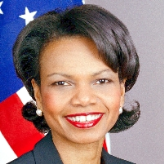Officials
Back to Officials


Offical

Name: Rice, Condoleezza
Current Position: Previous Secretary
A native of Birmingham, Alabama, Condoleezza Rice became Secretary of State on January 26, 2005, and served until President George W. Bush left office. Rice earned her bachelor’s degree in political science, cum laude and Phi Beta Kappa, from the University of Denver in 1974; her master’s from the University of Notre Dame in 1975; and her PhD from the Graduate School of International Studies at the University of Denver in 1981.
After finishing school, Rice joined the faculty at Stanford University in 1981 as a professor of political science. At Stanford, she was a member of the Center for International Security and Arms Control, a Senior Fellow of the Institute for International Studies, and a Fellow (by courtesy) of the Hoover Institution.
In 1986, while an international affairs fellow of the Council on Foreign Relations, Rice served as special assistant to the director of the Joint Chiefs of Staff.
From 1989 through March 1991, the period of German reunification and the final days of the Soviet Union, Rice served in the George H. W. Bush Administration as director, and then senior director, of Soviet and East European Affairs in the National Security Council, and a Special Assistant to the President for National Security Affairs.
In 1997, she served on the Federal Advisory Committee on Gender-Integrated Training in the Military.
In June 1999, she completed a six-year tenure as Stanford University’s provost, during which she was the institution’s chief budget and academic officer. As provost she was responsible for a $1.5 billion annual budget and the academic program involving 1,400 faculty members and 14,000 students.
In January 2001, Rice became the Assistant to the President for National Security Affairs, commonly referred to as the National Security Advisor, a post she held until becoming Secretary of State.
Rice has been a member of the boards of directors for the Chevron Corporation, the Charles Schwab Corporation, the William and Flora Hewlett Foundation, the University of Notre Dame, the International Advisory Council of JP Morgan and the San Francisco Symphony Board of Governors. She was a founding board member of the Center for a New Generation, an educational support fund for schools in East Palo Alto and East Menlo Park, California, and was vice president of the Boys and Girls Club of the Peninsula. In addition, her past board service has encompassed such organizations as Transamerica Corporation, Hewlett Packard, the Carnegie Corporation, Carnegie Endowment for International Peace, The Rand Corporation, the National Council for Soviet and East European Studies, the Mid-Peninsula Urban Coalition and KQED, a public broadcasting station in San Francisco.
Rice’s books include Germany Unified and Europe Transformed (1995) with Philip D. Zelikow, The Gorbachev Era (1986) with Alexander Dallin, and The Soviet Union and the Czechoslovak Army, 1848-1983: Uncertain Allegiance (1984).
During her time in the Bush administration, Rice has been at the center of numerous controversies involving the 9/11 terrorist attacks and attempts to politicize American intelligence. Following the attacks on the World Trade Center and Washington, DC, Rice was one of the key administration officials singled out by critics who argued the US government should have done more to warn and prevent the tragedy. In March 2004, Rice was involved in a high-profile controversy over her refusal to publicly testify under oath before the National Commission on Terrorist Attacks Upon the United States, more commonly referred to as the 9/11 Commission. When former White House counter-terrorism adviser Richard Clarke gave evidence on March 25, 2004, he bluntly said that Bush’s national security advisers, and Rice especially, failed to take warnings of al-Qaeda attacks on America seriously.
In the period leading up to the US invasion of Iraq in March 2003, Rice was one of the Bush administration’s most visible messengers arguing why the United States should go to war. Repeatedly, Rice promoted the weapons-of-mass-destruction argument, claiming Saddam Hussein’s government had such devices and that action was needed to rid this threat against the world. After the US secured control of the country and conducted numerous searches for WMDs, and found nothing, Rice again was a leading spokesperson trying to spin the administration out of trouble, claiming WMDs were never really the justification for the war.
In 2006, Rice ranked No. 2 on Forbes’ “100 Most Powerful Women in the World,” second only to Angela Merkel, chancellor of Germany. By 2008, Rice had dropped to No. 7.
Rice has the distinction of being the only Secretary of State who had an oil tanker named after her. Chevron named an oil tanker Condoleezza Rice but later renamed the ship Altair Voyager. Rice said the decision stemmed from her tenure on the board of the oil giant, which had a policy of naming tankers after its directors. Rice was a director of Chevron from 1991 to 2001.
The 100 Most Powerful Women: #2 Condoleezza Rice (Forbes)
- Latest News
- D.C. Public Schools will Teach all Second-Graders to Ride a Bike
- New Rule in Germany Limits Sales of Sex-Themed E-Books to 10pm to 6am
- What Happened to the 6-Year-Old Tibetan Boy the Chinese Government Kidnapped 20 Years Ago?
- U.S. Ambassador to Turkey Photoshops his Hair Color to Mock Turkish Mayor
- Mystery Artist Calls Attention to Unfixed Potholes by Drawing Penises around Them




